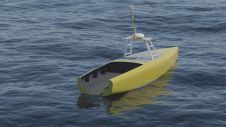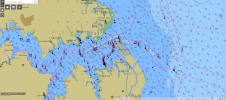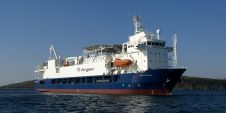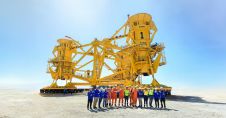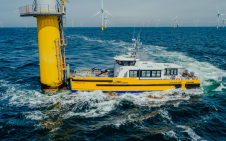Looking Forward to HYDRO ’06
HI Interviews Wim van Wieren, Organising Committee Chair
On the list of important conferences in hydrographic surveying are the HYDRO conferences, this year’s contribution to the series to be held in Antwerp. Chair of the organising committee is Wim van Wieren, currently employed as product and business manager at IHC systems and board member of the Hydrographic Society Benelux Branch, founding member of the International Federation of Hydrographic Societies.
Can you give our readers a brief summary on your career in hydrography?
After graduating from the Amsterdam Naval College Hydrography section in 1985 I worked on submarine sonar system developments for 'Hollandse Signaal Systems', now owned by Thales. Later, at the Netherlands Hydrographic Office, my focus was on supporting naval hydrographic and mine-warfare vessels in their survey-related operational tasks; this included software development for survey automation, data processing and charting, just beginning in those days. In 1996 I joined the Dutch Ministry of Transport (Rijkswaterstaat) survey department as project leader with a strong focus on positioning systems, system assessment and infrastructure development. As such, one of the main projects was the start of implementation of the Dutch inland GPS RTK network. After nearly thirteen years in governmental activities I joined IHC Systems in 2000 in the position of application engineer on dredge and survey-related systems. After three years I was asked to set up and lead the hydrographic department at IHC, together with Gerard Mallee, known to many of you. From the beginning of 2006 I was appointed manager, standard products engineering, at IHC Systems.
Hydro 2006 conference centres on 'Evolutions in Hydrography'. Why this theme?
When the organising committee chose this as theme I was immediately in favour of it because it covers
topics from past and future and it has a strong emphasis on development. This emphasis on development is a day-to-day fact for me because I am every day working on what we think is necessary and marketable in the future. Also, after twenty years in the hydrographic business and now, say, 'halfway' through my career, I have learned that our focus must be on the future but that lessons are learnt from the past. When I read columns like 'As it Was' and 'As it Is', I sometimes wonder if there could be something like 'As it Should Be'.
What do you feel are the most important evolutions in hydrography?
In general: global education and training. From a technical perspective the focus should be on developing new techniques for information management and on system integration for data acquisition and handling. I believe that the demand for conducting multidiscipline hydrographic surveys will always remain and I even believe that this demand will grow in the future. Waterways are an efficient transport system that will trigger economic developments and I foresee a growing demand for regional (port) development and (inland) waterway management. There will also be an increasing demand for land reclamation projects. These projects rely on knowledge of the underwater environment to develop sustainable environmental protection systems. On the other hand, exploration and exploitation of mineral reserves as well as future under- or near-water construction works for alternative energy sources will need knowledge of system integration for data acquisition and handling.
Introducing Antwerp as its venue, the Hydro 2006 organising committee presents the story of a survey carried out by MV Mon Desir during which large footprints were found on the riverbed of the Western Scheldt. The committee invites us to share our own survey-world stories. Do you have one for us?
I remember a particular survey in the late 80s, when I joined a UKMOD vessel fitted to calibrate the RACAL North Sea Hyperfix chain, chasing and charting the well-known 'C-O' values. To better survive the beer and long working hours, the ship's cook very enthusiastically stuffed me with his famous, fat, English dumplings. These things looked to me like our Dutch 'oliebollen', which I really like. After eating one of three on my plate I felt really sick, collapsed and I spent a good time hanging over the side of the vessel.
The November issue of Hydro is devoted to the topic of data management. Earlier you were employed in setting up the national cadastre's GPS-based primary network. Can you elaborate on the importance of data management in such projects?
Data management is of crucial importance in this type of system because the main reason for deploying them is that many customers rely on the information processed from the base-data. Particularly in a government-deployed system, where legal aspects are derived from the information, data management is important.
What sort of evolutionary developments do you foresee in data management, particularly in hydrography?
Continual upsizing of acquisition speed and quantity capacity, an increase in real-time processing intelligence as an answer to autonomous (robotic) acquisition methods, and intelligent sensoring. This will all lead to data cost reduction. The focus will come to be on information fusion from data. This is the key asset that will bring commercial value for various purposes.
Do you think these developments will have an effect on the work of the surveyor?
Yes, although not at core! Because the acquisition of data will become more efficient, surveyors will shift to the process of information creation and data-management consultancy. The main issue is that a surveyor handles equipment and procedures that acquire the data and pre-process this to a base-set from which useful information can be extracted.
In the introduction to Hydro06 you quote the Admirality Manual of Hydrographic Surveying of 1965: "The surveyors work in the field is of an arduous and often trying nature, but, unlike many other occupations in life, it results in a tangible and permanent record of the surveyor's labours and is often subsequently of historical interest. Moreover, the information which he gathers is essential for the furtherance of the scientific knowledge of the world in which we live'. This view presents a surveyor as a broadly trained person. Do you think present-day education delivers such surveyors and, if so, on what basis do you make this judgement?
The AMHS was the thesis award I received from the well-known Admiral Jan Kreffer on my graduation day. I feel that the Admiralty quote describes a certain character profile of particular necessity in doing the work. Therefore this phrase is on the wall of my office and I often use it in my work and presentations. To get back to your question, I am sure that the Dutch Willem Barentz Institute, successor to the Amsterdam Institute at which I studied, does, or certainly tries to deliver broadly trained surveyors. However, we have to be realistic. The character profile of the modern generation of students is definitely changing due to the changing social context.
What do you think should be the role of the national hydrographic societies in education?
The national hydrographic societies should actively promote science in every way they can. They should provide continual support for existing initiatives to search for and enthuse people to work in hydrography. Moreover, they should facilitate and promote as many possibilities for worldwide exchange of people and knowledge between communities and their educational institutions.
What sort of message would you like to pass on to youngsters seeking a career in hydrography?
Exploit the core characteristics of the profession by getting information from representatives of the professional society. To start a successful career you have to ask yourself three questions: can you do it, do you want to do it, and do you dare to do it?

Value staying current with hydrography?
Stay on the map with our expertly curated newsletters.
We provide educational insights, industry updates, and inspiring stories from the world of hydrography to help you learn, grow, and navigate your field with confidence. Don't miss out - subscribe today and ensure you're always informed, educated, and inspired by the latest in hydrographic technology and research.
Choose your newsletter(s)













